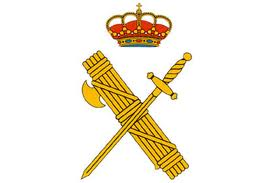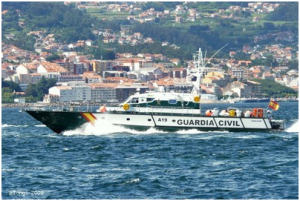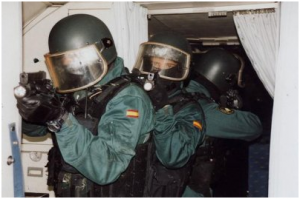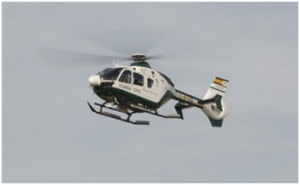The Guardia Civil is the first national law enforcement agency established in Spain. It was founded in 1844, early in the reign of Queen Isabel II of Spain, and with consensus among the different political forces.
The organization of this new institution was entrusted to the Field Marshal Mr. Francisco Javier Girón y Ezpeleta, 2nd Duke of Ahumada, who proposed the Government to establish an Infantry & Cavalry Force devoted to “the maintenance of law and order, and to assisting in law enforcement tasks as requested”. In this way, he was trying to fight the high level of insecurity inrural areas caused by banditry, and to set up a national law enforcement agency.
The territorial expansion allowed this body to deploy its units throughout the national territory, reaching places where the Administration had not been present before. With the passing of time, and due to its closeness to the people, it has become an extremely valuable source of information for the State.
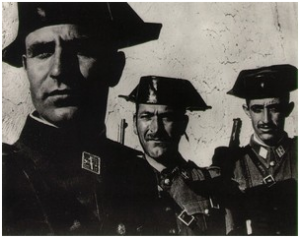 Since its foundation, and up to now, the Guardia Civil has been undergoing constant changes that have allowed it to adapt to new situations, always with countless efforts aimed at modernization. This fact, together with itscloseness to the people, has resulted in its being nowadays one of the most appreciated institutions by the Spanish society.
Since its foundation, and up to now, the Guardia Civil has been undergoing constant changes that have allowed it to adapt to new situations, always with countless efforts aimed at modernization. This fact, together with itscloseness to the people, has resulted in its being nowadays one of the most appreciated institutions by the Spanish society.
Apart from the constant adaptation and modernization of Guardia Civil we should also mention that it has progressively assumed new responsibilities, such as counterterrorism, road traffic control, protection of coasts, borders and territorial waters, environmental protection, or mountain rescue.
The Road Traffic Group (Agrupación de Tráfico) had the honour to become the flagship of the institution and to be its first specialised unit, paving the way for others that started appearing in the 1960s and the early 1970s, always with the aim of rendering a quality service to the citizens and provide humanitarian aid to whoever might need it.
Among these specialized units we could mention the Maritime Service, the Mountain Rescue Service, Air Service, the EOD Service, GAR (Early Intervention Group), or the Environmental Protection Service (SEPRONA).
Nowadays Guardia Civil is an armed institution of military nature that is part of the National Law Enforcement Agencies. As such, the 1978 Spanish Constitution establishes as its main mission protecting the free exercise of the rights and freedoms of Spaniards and ensuring public security, always under the authority of the Spanish Government.
Area of responsibilities
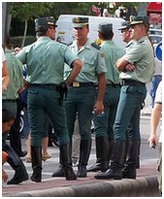 The Guardia Civil has more than two thousand stations deployed all over the national territory and covers, in square kilometres, approximately 84% of the total extension of the country, since several Autonomous Regions (Comunidades autonomas) have their own police forces, that have assumed public security responsibilities.
The Guardia Civil has more than two thousand stations deployed all over the national territory and covers, in square kilometres, approximately 84% of the total extension of the country, since several Autonomous Regions (Comunidades autonomas) have their own police forces, that have assumed public security responsibilities.
As far as the population is concerned, the Guardia Civil renders services to 35% of the inhabitants of the country, since the National Police Force that is also deployed throughout the national territory-, conducts its tasks in big cities, while the Guardia Civil does it in less populated towns and, in general, in rural areas.
However, there are several police tasks carried out exclusively by the Guardia Civil all over the national territory, such as the protection of the national economic interests, coast and border protection, environmental protection or control over weapons and explosives.
Hierarchical dependency
The Guardia Civil is accountable to two ministries: the Ministry of the Interior (as regards services, payments, positions and resources) and the Ministry of Defence (as regards promotion and military missions). Besides, it also responds to the needs of the Ministry of Finance as far as the protection of the national economic interests is concerned and, as administrative police, it ensures the enforcement of all the rules and regulations related to the different bodies within the National and Regional administrations.
Missions Within the field of public security, the Guardia Civil is responsible, as we have previously mentioned, for 84% of the national territory and territorial waters. Likewise, it looks exclusively after the control over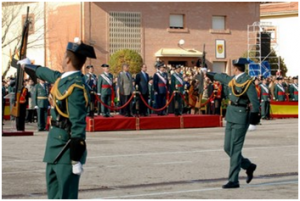 weapons and explosives, the protection of the national economic interests, road traffic between towns (except in those Autonomous Regions that have assumed those responsibilities), the protection of communication networks, seaports and airports, and environmental protection.
weapons and explosives, the protection of the national economic interests, road traffic between towns (except in those Autonomous Regions that have assumed those responsibilities), the protection of communication networks, seaports and airports, and environmental protection.
As criminal investigation police, it has the mission of investigating crimes in order to find out who the alleged offenders are and arrest them, drafting the necessary technical and expert reports. As administrative police, the Guardia Civil ensures the enforcement of all (national, regional or local) laws and regulations, reporting any infringement there of to the relevant Administration.
On the other hand, and under the authority of the Ministry of Defence, it conducts missions of military nature abroad and, as civilian police force, it also takes part in other missions carried out abroad by international bodies. Apart from that, they have deployed attachás and liaison officers in different embassies all over the world.
Structure of the organization & command structure
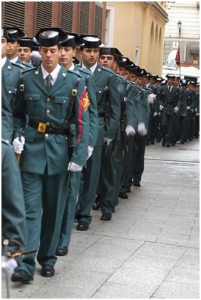 As regards the geographical deployment of the Guardia Civil all over Spain, we must mention that it is divided into: Regional Headquarters (Zonas), under the command of a General/ Colonel, and whose jurisdiction corresponds to that of Autonomous Regions (Comunidades autónomas); Provincial Headquarters (“Comandancias”), at provincial level, under the command of a Colonel/ Lieutenant colonel; Companies (“Compañías”), under the command of a Captain, that usually correspon to the geographical extension of a judicial district (several towns/ villages); and lastly, Stations (“Puestos”), whose geographical field of action usually corresponds to a municipality, and that are under the command of an NCO.
As regards the geographical deployment of the Guardia Civil all over Spain, we must mention that it is divided into: Regional Headquarters (Zonas), under the command of a General/ Colonel, and whose jurisdiction corresponds to that of Autonomous Regions (Comunidades autónomas); Provincial Headquarters (“Comandancias”), at provincial level, under the command of a Colonel/ Lieutenant colonel; Companies (“Compañías”), under the command of a Captain, that usually correspon to the geographical extension of a judicial district (several towns/ villages); and lastly, Stations (“Puestos”), whose geographical field of action usually corresponds to a municipality, and that are under the command of an NCO.
At the operational level, the Regional Headquarters and their different units report to the Deputy Directorate for Operations, like the Command Offices for Road Traffic, Customs & Borders, Intelligence, Nature Protection, Criminal Investigation Police and Specialized Units, all of them under the command of a General.
The General Under-Directorate for Personnel comprises the Command Offices for Personnel (in charge of promotions, positions and status of personnel); for Training (in charge of selection and training); for Assistance to Personnel (in charge of social benefits, and of health and psychological care for members of the GC). It also includes a Secretariat for Staff Assessment and Classification. These Command Offices and Secretariat are under the command of a General.
The General Under-Directorate for Support consists of three Command Offices, each one of them under the command of a General: Technical Assistance (in charge of IT and telecommunications networks); Financial Services; and Support Services (in charge of police equipment and weaponry).
The Guardia Civil has more than 80,000 members, divided into six different categories, according to the ranks they hold:
- Higher Officers Category (Escala Superior de Oficiales): Candidates join this category after reaching the rank of Lieutenant, and it implies that they will be considered as holding a 5-year University Degree (“Título de Licenciado”) within the general education system. They can join this category either through internal promotion, once they have become 2nd lieutenant (20% of the positions announced are reserved to this end), or through direct access, after passing a public competition.
- Officers Category (Escala de Oficiales): Candidates join this category after becoming a 2nd Lieutenant, and it implies that they will be considered as holding a 3-year University Degree (“Título de Diplomado universitario”) within the general education system. Candidates can only join this category through internal promotion after passing an internal public competition.
- Superior Expert Officers Category (Escala Facultativa Superior): In order to join this category, candidates must hold a 5-year University Degree corresponding to the field of expertise specified in the relevant official announcements, according to the yearly offer of positions. Up to 75% of the positions announced can be reserved for Guardia Civil members. Candidates join this category directly, after passing a public competition
- Technical Officers Category (Escala Facultativa Tácnica): In order to join this category, candidates must hold a 3-year University Degree corresponding to the field of expertise specified in the relevant official announcements, according to the yearly offer of positions. Up to 75% of the positions announced can be reserved for Guardia Civil members. They join this category directly, after passing a public competition
- NCOs category (Escala de Suboficiales): Candidates join this category through internal promotion. All the positions announced are reserved for members of the Corporals’ and Guardia Civil Ordinary Officers’ category, with a term of duty of at least two years in it. They join this category directly after a public competition, having five opportunities as a maximum, and candidates must compulsorily have a higher certificate (título de Bachillerato Superior).
- Corporals’ and Guardia Civil Ordinary Officers’ category (Escala de Cabos y Guardias): in order to access the Guardia Civil. 50% of the positions announced in order to join this category are reserved for professional ordinary members of the Spanish Army (who must have completed at least a five-year term of duty on the date established to start attending the training centre), students of the Colegio de Guardias Jóvenes, and free access. Candidates join this category after a public competition. They can be promoted within the same category up to the rank of corporal, by means of a public competition.
In order to join the Higher Officers Category, and after passing the corresponding public competition, it is compulsory attending a two-year training period at the General Military Academy (Academia Militar General), and another three-year training period at the Guardia Civil Officers Academy (Academia de Oficiales de la Guardia Civil). If access is gained through internal promotion, the training period will last two years at the Guardia Civil Officers Academy.
In order to gain access to the Officers Category, candidates must successfully complete a nine-month course at the Officers Academy, after having passed the corresponding public competition.
In order to join the Bachelor’s Degree Category or the University Graduates Category, and after the corresponding public competition, candidates must successfully complete a nine-month course, to be given both at the General Military Academy and at the Guardia Civil Officers Academy.
Access to the NCOs category is gained after successfully completing a nine-month training period at the Guardia Civil Ordinary Officers and NCOs Academy (Academia de Guardias y Suboficiales de la Guardia Civil). Those candidates who, after having passed the exam to access the Guardia Civil, will be joining the Corporals’ and Guardia Civil Ordinary Officers’ Category must also attend a nine-month training period at this academy.
Around 4% of the Guardia Civil strength are officers, more than 8% belong to the NCOs category, and nearly 88% belong to the Corporals’ and Ordinary Guardia Civil Officers’ category.
Presence abroad
For the last twenty years, the Guardia Civil has had an important international presence, cooperating with police forces from different countries and international institutions.
At present, approximately 350 Guardia Civil members are deployed in different countries in the five continents, conducting different missions such as peacekeeping, technical assistance to police forces from other countries, security missions in embassies and police cooperation with international organizations.
In the different peace operations currently in progress, a total number of 123 Guardia Civil members are working in countries such as Haiti, Afghanistan or Bosnia i Herzegovina, carrying out civilian or military police tasks, depending on the relevant international organization and the kind of mission being conducted.
As regards technical assistance tasks, 19 GC members are deployed in countries such as Gambia, Senegal or Mauritania, cooperating and advising police forces in these countries. Likewise, 75 Guardia Civil members are cooperating with international organizations such as UN, NATO or OSCE. At embassies or international institutions, a total 105 strength is rendering security services, while 22 officers are working as attachás and liaison officers at those embassies.
The website: www.guardiacivil.org


